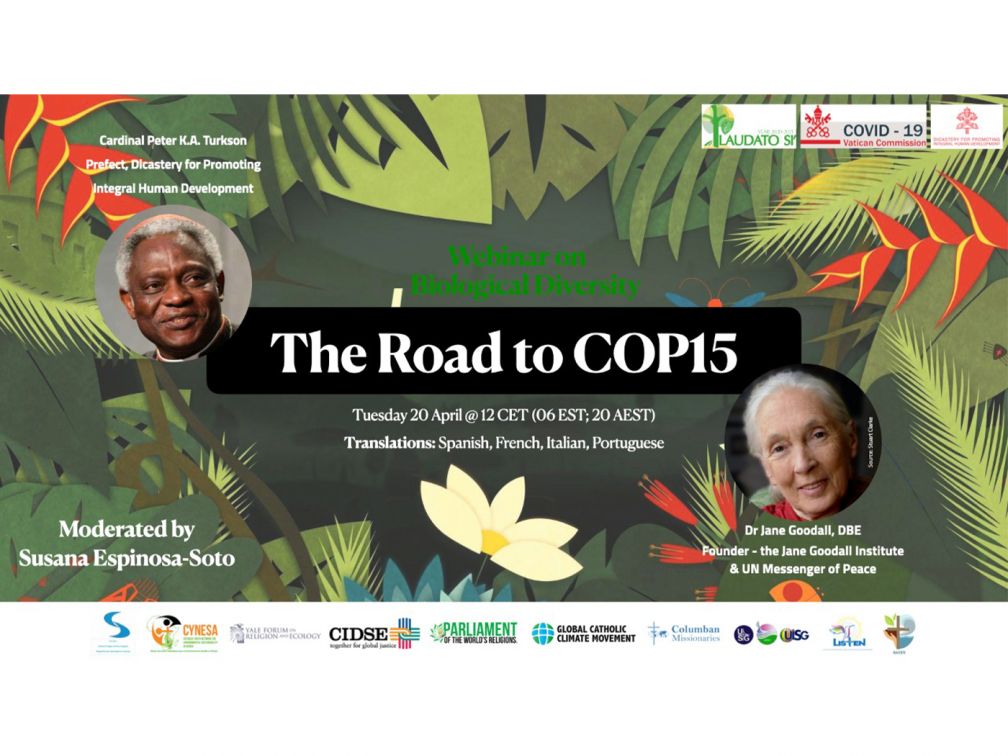A global audience of more than 1,000 – including Columbans – joined a webinar on biodiversity this week organised by the Vatican Dicastery for Promoting Integral Human Development and the Global Catholic Climate Movement (GCCM). They engaged in a conversation about the biological variety and variability of life on Earth with Cardinal Peter Turkson, Prefect of the Dicastery, and famous primatologist Dr. Jane Goodall. In fact, before she started her presentation, Dr. Goodall – ever creative, inspiring and hopeful at the age of 87 – gave a chimpanzee greeting!
The Covid19 health crisis, the climate crisis and the biodiversity crisis are three interconnected emergencies calling us to change direction towards a transformed civilisation. This webinar explored how together we can take responsibility for creating a better future.
Cardinal Turkson announced that the webinar was preparing for Conference of Parties (COP)15 on Biodiversity in China 11-24 October 2021. Speaking from Rome, he felt the safeguarding of biodiversity must go alongside action on climate change and tackling the widening gap between rich and poor. “The way humanity treats the environment is the way it treats itself” he said “and the health of humanity depends on the heath of nature.” He highlighted that there is a framework for protecting diversity in the Convention on Biological Diversity.
Nature’s contribution to human well-being and development should be more valued, said the cardinal. And there are “clear actions for protecting biodiversity”, specifically respecting and protecting other species, undergoing ecological conversion, and acknowledging that indigenous people are the great teachers of utilising and safeguarding biodiversity.
He called for planting trees, creating Laudato Si’ gardens, “living chapels”, and sustainable use of church land. Also, linking with like-minded people to prevent further biodiversity loss.
Dr. Goodall spoke from England with background images on her bookcase of chimpanzees, elephants, a badger, alongside St. Francis of Assisi and a wooden crucifix inclusive of a peace dove. “How could we destroy our only home?” she asked; “we brought the Covid-19 pandemic on ourselves by our disrespect of animals and the natural world.” She criticised wild animals being forced closer to human society by being captured alive, and body parts trafficked and eaten. “In these cruel conditions it is easy for a pathogen such as a virus to spill over and such a pandemic has been predicted for a long time.” She reflected, “what does God think about the suffering we are inflicting on God’s creatures?”
She deplored terrible conditions in factory farms and industrial development as root causes of climate change. However, she felt there is “a small window” to act. Dr Goodall called for the phase out of industrial agriculture and to live more sustainably with simpler lifestyles. When we buy food we should ask: Where did it come from? Was it produced with fairness? She suggested that, “organic food may cost more but it will be valued more and less is wasted.” She called for measures to eliminate poverty and help people not to be compelled to destroy their environment to survive. We must plant trees. “Nature is so kind she will reclothe areas we have destroyed,” said Dr. Goodall; “let’s create a better future where animals and nature can be respected, not just for what they offer us but for who they are.”
There were plenty of questions in a session chaired by the Global Catholic Climate Movement, from Laudato Si animators, Justice and Peace activists across all continents. Also, many grassroots groups, such as the Council of Integral Ecology and Multifaith in South Australia, Saskatchewan’s Treaty 4 land in Canada, and the Philippine bishops’ Commission on Indigenous Peoples.
When asked about reasons for hope, Dr. Goodall praised Pope Francis, saying, “his stand on the environment has made a big difference and other religions too are talking about the environment more and more.” She also applauded, “scientists coming together to say that there is intelligence behind the creation of the universe.” She reflected that she has lived long enough to see the banning of fur and reptile skins in products, the power of consumer pressure and growing environmental awareness with the engagement of young people.
While some people applauded people of many faiths for stepping up to sound the alarm on climate change and call for care for the Earth, others felt religious groups were not doing enough. Cardinal Turkson was urged to appeal to clergy to read and study Laudato Si’ and preach creation care in their churches for “we are rarely hearing it.” He favoured giving more visibility and support those who are doing it! From the Philippines it was pointed out that the Catholic Bishops’ Conference has established a National Laudato Si’ Program. Part of it is institutionalising the celebration of Laudato Si’ Week and the Season of Creation in all dioceses and bringing care for creation into the liturgy.
Partnerships were valued as a way forward and the webinar was supported by a list of partners including the Columban Missionaries.
…………………………………………………………………………………………………………………………………………………………………………………………………….
As Catholics, Columbans believe that creation – animals, plants, ecosystems, and all natural things – is a sacred gift from God and that God is revealed to us through each member of creation. But has this fundamental teaching of our faith always informed our spirituality? And how should it now, especially in this time of ecological crisis?
The society recently published a fantastic podcast on biodiversity tilted ‘Jubilee for the Earth’. In this, the first episode from said podcast, Columban priest Fr. Dan Troy talks with geologist and botanist Dr. John Feehan about the urgency of reconnecting our appreciation of nature with our everyday faith.

